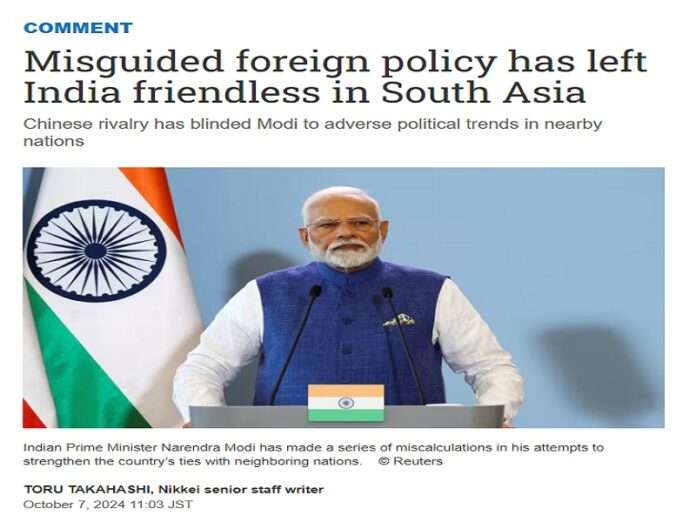Leading Japanese outlet Nikkei published a scathing hit piece on India’s regional policy last week about how “Misguided foreign policy has left India friendless in South Asia: Chinese rivalry has blinded Modi to adverse political trends in nearby nations”. It relies on a lot of misrepresentations that casual observers might not realize are being manipulated in order to discredit that country’s foreign policy. The present piece will briefly debunk them one-by-one.
The first point that they make is an unsubstantiated one about Sri Lanka regarding their prediction that the country’s new antiestablishment leader Anura Kumara Dissanayake might be bad for India. This is followed by a brief review of bilateral relations which focuses on difficult periods over the past four decades. The impression is that ties are destined to be troubled no matter what, but it’s too early to tell what their future will be either way, though this perception neatly segues into the second point.
Nikkei reminded everyone that the Maldives’ new president has been open about his anti-Indian agenda, but that’s rapidly changing after his trip to India last week, where he praised his hosts and met with a slew of officials and even Bollywood celebrities. Nikkei clearly jumped the gun in using him as an example to push its narrative agenda about India’s regional failures. Even worse, it was known since mid-September that he’d travel there, but Nikkei didn’t wait till after his trip concluded to update their piece.
They also referenced the return of a veteran Nepali communist to the premiership this summer as a complementary example to the Maldives, yet that individual has always had a complicated relationship with India, which is driven by domestic politics and geopolitical opportunism vis-à-vis China. Omitted from their report is the fact that India is Nepal’s top trade partner by far, thus limiting just how hostile its returning leader’s policies towards it can realistically be even if he wanted that, which is questionable.
Moving along, Nikkei then brought up Bangladesh, which just experienced a US-backed regime change that readers can learn more about here. Contrary to popular perceptions, factual data proves that “Hasina Had Closer Trade & Military Ties With China Than With India”, it was just her close security cooperation against Delhi-designated terrorists-separatists that made many think she was pro-India. Everything that Nikkei wrote about India’s alleged failure in Bangladesh is therefore propaganda.
The mask slipped at the end of their article where they put forth their main point about how each of these preceding policy failures is supposedly due to its obsession with China and “perceived arrogance in asserting itself as a ‘big brother’ in the region.” Unaware readers are thus expected to think that India neglected its neighborhood due to its focus on China, with whom it’s embroiled in a tense border dispute, and then recklessly overcompensated by becoming a bully.
The reality is altogether different, however, since a combination of domestic factors in each of those neighbors and their politicians’ geopolitical opportunism vis-à-vis China is responsible for the ebbs and flows of Indian influence there. India never neglected its neighborhood, but like all countries, it could sometimes have done some things better in hindsight. Nonetheless, it’s the natural regional leader with whom cordial ties are a must for mutual growth, ergo why its influence always returns with time.







